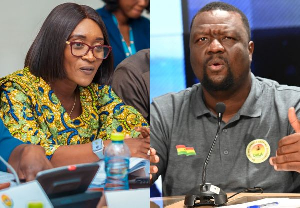adverts
A tense exchange unfolded during the Public Accounts Committee (PAC) sitting on Tuesday when Chairperson Abena Osei Asare confronted the Chief Executive Officer of the Driver and Vehicle Licensing Authority (DVLA), Julius Neequaye Kotey, over concerns surrounding data privacy and personal security in the Authority’s proposed digital vehicle registration system.
The confrontation centred on the DVLA’s plan to introduce digital number plates embedded with Radio Frequency Identification (RFID) chips, which Mr Kotey said were part of efforts to enhance vehicle traceability and anti-tampering security features.
“These new plates will make it very difficult for external entities to tamper with or replicate,” Mr Kotey explained, assuring the Committee that the technology would strengthen national security and streamline vehicle registration.
adverts
However, the PAC Chairperson pressed for clarity on what personal information would appear on the plates, raising concerns about possible breaches of citizens’ privacy.
“Because in putting out somebody’s security out there, a bad person can also get hold of that,” she said, questioning whether vehicle owners’ surnames would be publicly displayed on the new digital plates.
Mr Kotey responded that the DVLA would strictly comply with Ghana’s Data Protection Act, emphasising that the new system would digitalise existing data without altering the current format of number plates.
But when asked directly whether surnames would be included, he replied, “It depends on what the law says; we’ll go by it.”
That answer drew an immediate rebuke from the PAC Chair.
“You don’t tell me it depends on what the law says,” she fired back. “You are doing it. So you should be able to tell us that the law says ABCD. I’m asking a specific question: is it going to have the user’s surname on the number plate?”
Mr Kotey then clarified that standard number plates do not include personal names, saying, “We don’t put names on number plates.”
But the Chair quickly countered:
“People pay to have their names on number plates, and you sit here as the DVLA boss to tell me you don’t put names on number plates? That’s not accurate.”
The exchange grew visibly heated when Mr Kotey attempted to explain further, prompting the Chair to accuse him of suggesting her question was unnecessary. The DVLA boss later withdrew the comment, clarifying that he only meant that regular number plates, unlike personalised ones, do not display names.
The PAC Chair accepted the withdrawal but stood firm on the Committee’s position that public transparency was critical to the success of the digital plate rollout.
“Our questions are in the public interest. Ghanaians need to understand how this system works, what data is being collected, and how their privacy will be protected,” she stated.
The digital number plate initiative, officially known as the Digitalised Vehicle Registration Plate (DP) project, is part of the DVLA’s wider modernisation agenda. It aims to integrate real-time vehicle tracking, automated tolling, and enhanced law enforcement coordination through RFID-enabled plates.
Click the link Puretvonline.com | WhatsApp Channel to join the WhatsApp channel
GOT A STORY?
Contact/WhatsApp: +233243201960 or manuelnkansah33@gmail.com


